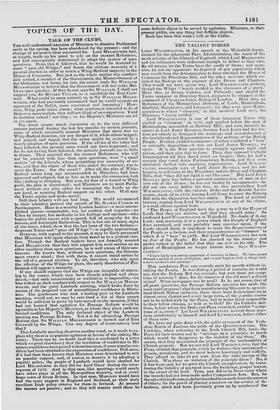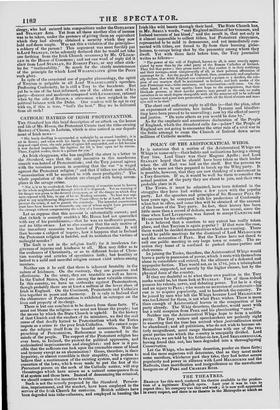THE VALIANT TORIES.
LORD WHARNCLIFFE, in his speech at the Wakefield dinner, claimed for the ephemeral PEEL Administration, the merit of the mock reforms of the Church of England, which Lord MELBOURNE and his colleagues were indisereet enough to father as their own. By all means, let the Tories have the credit of them; and more- over, let not our opponents be deprived of any popularity which may result from the determination to force through the House of Commons the Pluralities Bill, and the other measure which en- riched the Bishops at the expense of the Deans and Chapters. They would not have given way, Lord Wit ARNCLIFFE protests, though the Whigs " basely yielded to the clamours of a party." Hear this, ye Deans, Canons, and Prebends ; and should the Tories reappear in Downing Street, prepare to be stripped at the command of CHARLES Jciwv, Bishop of London. Hear this, ye Reformers of the Metropolitan Districts, of Leeds, Birmingham, Sheffield, Manchester, and Liverpool ; for they were your Repre- sentatives to whose " clamour," as this insolent Lord says, the Ministers " basely yielded.'
Lord WHARNCLIFFE is one of those trimming Tories who yielded to " clamour " in 1832, and quailed before the men of Birmingham, assembled on Newhall Hill; and now, forsooth, he sneers at Lord JOHN RUSSELL, because Lord JOHN had the wis- dom not utterly to disregard the warnings and rCITIOIISIlitaCeS of the lawfully-elected Representatives of the millions of the British People. If either yielded to clamour—if either exhibited a " base" or cowardly disposition—it was not Lord JOHN RUSSELL, we opine. It is the Tory practice to struggle against right and reason, and then give way to force. Thus, they opposed Catholic Emancipation till they dared resist no longer ; thus, for half a century they voted down Parliamentary Reform, and then were absolutely bullied into sneaking acquiescence. Lord WHARN- CLIFFE sneeringly says of Lord JOHN RUSSELL and his col- leagues, in reference to the Pluralities and the Dean and Chapters Bills, that "they (lid not fight it out like men." But Lord JOHN RUSSELL gave way before a powerful combination of men on his own side of the House ; he was not beaten by his opponents—he did not run away before his foes, as this gasconading Lord WHARNCLIFFE, with the valorous Duke and the flexible LYND- HURST, slunk off in 1832, leaving Lord GREY to carry the Reform Bill with the Opposition benches empty. The boast of political bravery, coming from Lord WHARNCLIFFE or any of his clique, is a rank offence against taste. "The People of England have the power to tell the House of Lords that they are useless, and that they should retire." So confessed Lord WHARNCLIFFE at Wakefield. No doubt of it, my Lord ; and, moreover, it is a power which the People of England have exercised, and very probably may exercise again, if the Lords should think it expedient to treat the Representatives of the People as a faction, and their remonstrances as "clamour" to which it is " base " to yield. But Lord WHARNCLIFFE has now no fear of the People. He has plucked up his courage and grown valiant in the belief that they are now on his side. The ghost of Birmingham no longer haunts him. Says WHARN- CLIFFE— " I have lately seen strong symptoms of recovery in them. We have passed through a period of ,,reat excitement, and we now begin to look at things with a more moderate and quiet eye."
This mushroom Peer can scarcely open his mouth without in- sulting the People. It was during a period of insanity, he would say, that the Reform Bill was carried; but now there are symp- toms of recovery ! Alas, for the dimness of the old man's political vision! What newspaper can he read? Is he not aware, that of all great questions, the Peerage Reform question has made the most rapid progress? that from manufacturing Glasgow to agricul- tural South Melton inclusive, there have been demonstrations in almost every district and every large town, of the popular resolve not to be trilled with by the Peers, but to make them responsible to their fellow citizens, as well as to God? Do the Catholic mil- lions, before whom the Duke and PEEL crouched, exhibit " symp- toms of 1...X1VeTV ?" Let Lord Wneeerc Men.: answer these ques- tions satisfactorily to himself and Lord LYNDHUItST, before either of them crow.
We have not quite done with the noble ornament of the York- shire Bench of Justices the pride of the Quarter-sessions. His Lordship, when referring to the Irish Church Bill, lauds the
Peers for their resolve not to "infringe on a principle, to touch which would be dangerous to the stability of the State." He
means, that they maintained the principle of the inalienability of
Church property. But we can tell Lord WHARNCLIFFE, that the Peers violated that principle, which he declares they maintained—
grossly, manifestly, and we must believe knowingly and wilfully.
They offered to take 20 per cent. from the tithe income of the Church. Was there no violation of the principle there ? No, it
it has been said, for we gave the Church an equivalent, by trans- ferring, the liability of payment from the bankrupt, pauper tenant, to the owner of the land. True, you did so in those cases where
the transferhad not been made under Composition Acts. But, for the sake of this advan tage,deductions had been made from the amount of tithes; for the power of placing a receiver on the estates of de- faulters, much bad been previously given up by numbers of the
clergy, who had entered into compositions under the GOULBURN and STANLEY Acts. Yet from all these another slice of income was to be taken, under the pretence of giving them an equivalent which they had already obtained a security which they now hold and deem ample. Was not this a violation of the principle— a robbery of the parson? This argument was most forcibly put toLord STANLEY, (who solemnly declared that be would not take one farthing from the Irish Church revenues,) by Mr. °loon- LEN in the House of Commons ; and not one word of reply did it elicit from Lord STANLEY, Sir ROBERT PEEL, Or any other stick- ler for " inalienability." So much for the sturdy maintenance of the principle for which Lord WHARNCLIFFE gives the Peers such glory. In spite of the occasional use of popular phraseology, the spirit of Toryism is palpable in all Lord WHARNCLIFFE s speeches. Professing Conformity, he is still a Tory to the backbone. But yet he is one of the best-informed, one of the ablest men of hi s party—discreet and moderate compared with LYNDHURST, rational when by the side of RODEN, a statesman when weighed in the political balance with the Duke. Our readers will be apt to say with us, if this is true, " bad's the best." May we be delivered from all such!



























 Previous page
Previous page